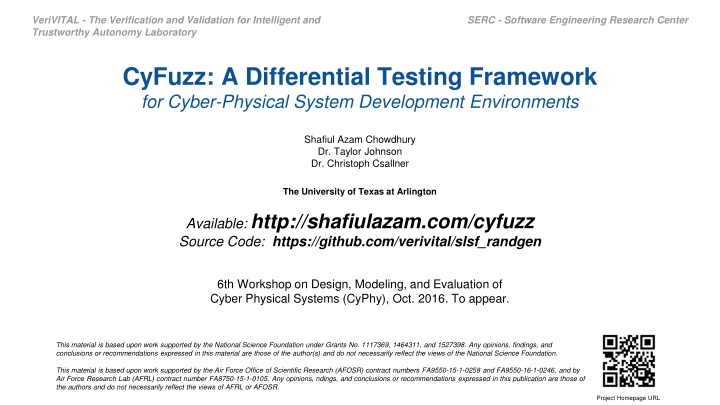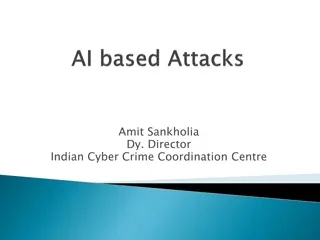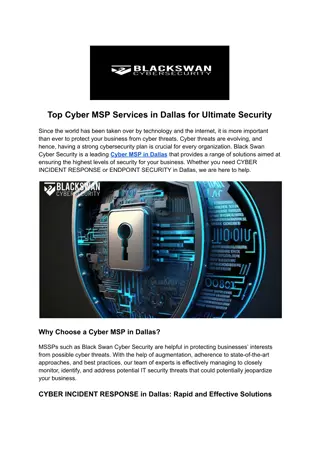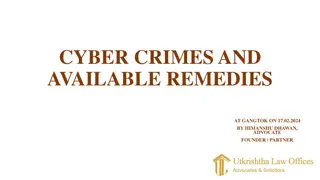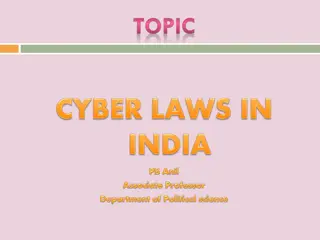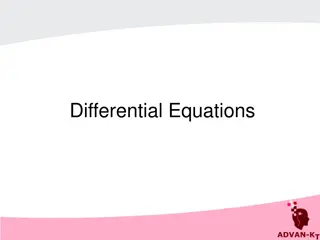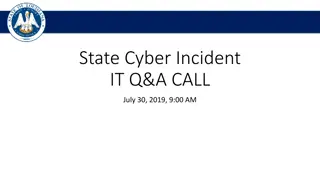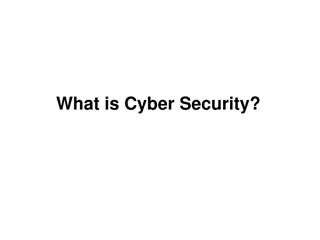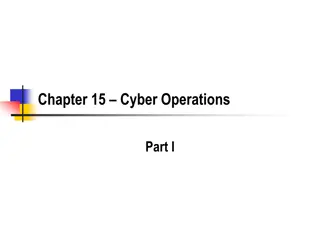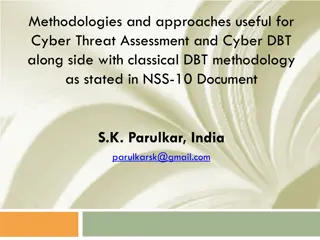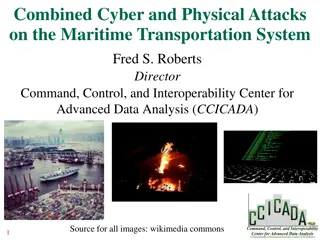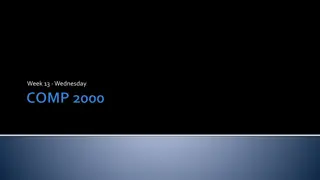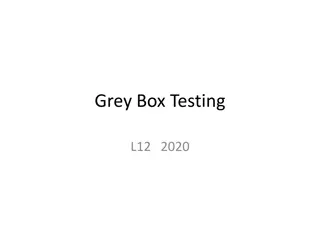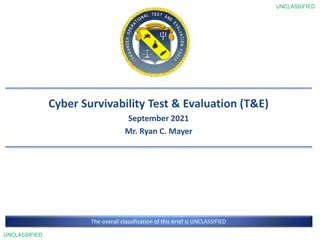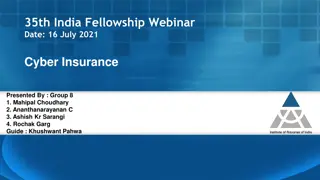CyFuzz: A Differential Testing Framework for Cyber-Physical System Development
The VeriVITAL lab at the University of Texas at Arlington has developed CyFuzz, a differential testing framework for ensuring the trustworthiness of cyber-physical system development environments. Supported by NSF and Air Force grants, CyFuzz aims to detect defects and improve tools in CPS development by testing assumptions and verifying components.
Download Presentation

Please find below an Image/Link to download the presentation.
The content on the website is provided AS IS for your information and personal use only. It may not be sold, licensed, or shared on other websites without obtaining consent from the author.If you encounter any issues during the download, it is possible that the publisher has removed the file from their server.
You are allowed to download the files provided on this website for personal or commercial use, subject to the condition that they are used lawfully. All files are the property of their respective owners.
The content on the website is provided AS IS for your information and personal use only. It may not be sold, licensed, or shared on other websites without obtaining consent from the author.
E N D
Presentation Transcript
VeriVITAL - The Verification and Validation for Intelligent and Trustworthy Autonomy Laboratory SERC - Software Engineering Research Center CyFuzz: A Differential Testing Framework for Cyber-Physical System Development Environments Shafiul Azam Chowdhury Dr. Taylor Johnson Dr. Christoph Csallner The University of Texas at Arlington Available: http://shafiulazam.com/cyfuzz Source Code: https://github.com/verivital/slsf_randgen 6th Workshop on Design, Modeling, and Evaluation of Cyber Physical Systems (CyPhy), Oct. 2016. To appear. This material is based upon work supported by the National Science Foundation under Grants No. 1117369, 1464311, and 1527398. Any opinions, findings, and conclusions or recommendations expressed in this material are those of the author(s) and do not necessarily reflect the views of the National Science Foundation. This material is based upon work supported by the Air Force Office of Scientific Research (AFOSR) contract numbers FA9550-15-1-0258 and FA9550-16-1-0246, and by Air Force Research Lab (AFRL) contract number FA8750-15-1-0105. Any opinions, ndings, and conclusions or recommendations expressed in this publication are those of the authors and do not necessarily reflect the views of AFRL or AFOSR. Project Homepage URL
Engineering process of CPS Model-based design Development environments Simulation & Code Generation Image on the right: sample Simulink model. This image is licensed under the Creative Commons Attribution-Share Alike 4.0 International license. Media URL: https://commons.wikimedia.org/wiki/File:Simulink_lept.png 1
Defects in Development Environments Typical assumptions: Compilers Code Generators Simulators Tools Do not have bugs 2
Defects in Development Environments Typical assumptions: MLOC Program (CPS tool chain) Without bugs? Compilers Code Generators Simulators Tools Do not have bugs 3
Defects in Development Environments Typical assumptions: MLOC Program (CPS tool chain) Without bugs? Compilers Code Generators Simulators What happens if CPS tool chain injects subtle bugs/security holes into CPS? Tools Do not have bugs 4
Tools Improvement Approaches Formally verifying components [-] Currently Not feasible Large codebase [-] No complete and/or updated specifications Rapid release cycle of products 5
Background: Differential Testing Test Code, Model generate Generator Compiler 1 Compiler 2 Test Subjects compile Binary 1 Binary 2 execute Output 2 Output 1 ? compare 6
E.g. Csmith: Yang et al. [2011] Random Generator generate C gcc -o2 gcc -o1 llvm -o0 Varying compilers & optimization settings compile compile Binary 1 Binary 2 crash execute Output 1 Output 2 ? compare 7
Background: Differential Testing [+] Don t need full formal language specs to find bugs Random Generator Code, Model generate [+] No false warnings if undefined behaviors are avoided Compiler 1 Compiler 2 [+] Inexpensive Test Subjects compile Binary 1 Binary 2 execute Output 2 Output 1 ? compare 8
Background: Differential Testing [+] Don t need full formal language specs to find bugs Random Generator Code, Model generate [+] No false warnings if undefined behaviors are avoided Compiler 1 Compiler 2 [+] Inexpensive Test Subjects compile Others found many bugs with this in production compilers / tools which are part of the CPS tool chain Binary 1 Binary 2 execute Output 2 Output 1 ? compare 9
New Challenges for Fuzzing CPS tool chain Having some spec. is useful: Efficient generator (not generating many invalid tests) E.g. Csmith generate tests following C99 specification 10 Image: The C99 standard, screen-captured from URL: http://www.iso.org/iso/iso_catalogue/catalogue_ics/catalogue_detail_ics.htm?csnumber=29237
New Challenges for Fuzzing CPS tool chain Not the case with Simulink: Do not have publicly available complete, updated specs. How to generate valid models which the CPS tool chain can accept without raising errors? Feedback-driven model generation approach Guide model generation via CPS tool chain errors/warnings 11
New Challenges for Fuzzing CPS tool chain CPS model contains mix of language paradigms: Dataflow (nodes, edges) and procedural (C code) Previous work limited to single paradigm (mostly procedural) 12
New Challenges for Fuzzing CPS tool chain Vast search space Industrial CPS design tools: Very complex modeling languages Many, many configuration options, platforms, etc. 13
Our Contributions Study of publicly available Simulink bug reports CyFuzz: A conceptual framework for arbitrary CPS environment Prototype implementation for Matlab s Simulink Preliminary evaluation 14
A Study of Bugs Bug reports published for Matlab/Simulink version 2015a on Simulink s web site Search for: incorrect code generation 17 Feb 2016: 50 bug reports, 47 fixed in subsequent releases Example finding: Over 50% of reports: Simulation result Output of generated code Differential testing seems promising Our study results online: https://docs.google.com/spreadsheets/d/1l0npmC7k906M5rECmLmfALXT-kLD3mRtX-3ylUXTmxc/pubhtml 15
A Study of Bugs Bug Reports [%] Classification Factor Reproducing the bug involves a code generator 60 Reproducing depends on block parameter values and/or port or function argument values and data-types 56 Reproducing indicates mismatch between simulation result and generated code's output 54 Reproducing depends on the way blocks are connected 36 Reproducing depends on overall model configuration settings 32 16
Hierarchical Model 1 18
CyFuzz: Phases Random Model Generator Comparison Framework 19
Select Blocks Generate N blocks N selected randomly from a range Randomly from block libraries, according to customizable weights Currently only from 4 libraries Simulink libraries: 15 built-in plus more from toolboxes Hierarchy up to configurable depth (more on hierarchy later) Customize Csmith to generate C code, integrate via Simulink S-function 21
Select Blocks n: 15 Library Config. Actual Discrete 35% 33.33% Concrete 35% 33.33% Source 15% 20.00% Sink 15% 13.33% 22
Hierarchical Model Creation Calls Select Blocks method to create a child (aka sub) model Child model can select parameters (number of blocks, block selection parameters etc.) on its own Parent model does not reuse child model (but could) Child s own blacklist (and whitelist) of blocks (not all blocks can be used in a child model) 23
Configure Blocks Parameter values currently fixed, but could be random Configures some (whitelisted) parameters 24
Connect Blocks Maximize number of connected blocks Randomly choose input/output ports Prioritize unconnected ports 25
Fix Errors Error in compiling the model 26
Fix Errors Identify problematic components Exploiting Matlab s exception handling mechanism 27
Fix Errors Added a new block to fix data-type incompatibility 28
Fix Errors For example: Algebraic Loop elimination Model with algebraic loop 29
Compile and Simulate timeout model Tool chain configuration Compilation is the first step of simulating a model. simulate will stop immediately if a compilation error occurs. 30
Compile and Simulate Error Messages ENUM: {success, Error, Timed-out} Logged Signals 31
Fix Errors Simulink error messages are quite detailed Use error message to drive repair action Our repair may introduce new errors Repeat R times [+] Easy to implement No knowledge of type rules needed [+] Worked surprisingly well (in our evaluation) 32
Log Signals and Compare 0.5 - 0.4 - 0.1 == 0 False! 33
Custom Blocks Integrating procedural code (C/Matlab) in models Implemented using S-Function interface of Matlab/Simulink 35
Custom Blocks (simplified example) static void mdlOutputs(SimStruct *S, ...){ InputRealPtrsType uPtrs = ssGetInputPortRealSignalPtrs(S,0); real_T ssGetOutputPortRealSignal(S,0); *y = Input Output ... ??? ... *y = 2.0 *(*uPtrs[0]); } How to calculate output at each simulation step? 36
Custom Blocks Plugging random C code as Simulink blocks Harness Csmith to generate random code High-level Issues: Csmith-generated functions can not be called safely multiple times after linking as Simulink blocks (re-initialize variables) Using data from other blocks in Csmith-generated functions (pass these values to Csmith-generated variables) Floating-point support in Csmith is still primitive (detect crash bugs only) 37
Prototype Implementation Details Comparison Framework: Simulink s Signal Logging API & sim command invocation Varies simulation modes E.g. Normal Mode vs. Accelerated Mode with Optimization On 38
Research Questions RQ1. Is the random generator effective? Which portion of the generated models can Simulink simulate? RQ2. Can CyFuzz find Simulink bugs? RQ3. What is the runtime of CyFuzz s phases? Not included in the evaluation: Custom Blocks Hierarchical Models 39
RQ1: Effectiveness of Random Generator [+] Simulink successfully simulated some 80% of generated models Errors and time-outs fluctuated with library weights 40
RQ3: Runtime Average sum of all phases around 45s Most expensive phase: Simulation & Signal logging 41
RQ3: Runtime [+] Block Selection Algorithm has O(n) runtime [+] Scales linearly with number of blocks Number of timed-out and error models also increase Addressing one type of error in Fix Errors phase reduce number of error models 42
RQ2: Effectiveness of Comparison Framework [+] Independently reproduced a known Simulink bug: Hierarchical model Output differ between Normal and Rapid Accelerator Modes Bug confirmed and fixed in later releases CyFuzz-generated model that triggers the bug: 43
0 vs. 13E247 X Axes: Simulation Iterations Y Axes: Block Outputs (numbers) 44
Future Work Full-fledged fuzzer for Simulink Incorporate more built-in libraries in the Random Generator Having custom blocks in generated models (integrate Csmith) Varying more configuration options in the Comparison Framework Compare signals in multiple simulation steps Contribute: https://github.com/verivital/slsf_randgen 45
Related Work 46
Compilers and Type-checker Fuzzers Jsfunfuzz Jcrasher [28] LangFuzz [27] Rugrat [29] Csmith [10] Many core compiler fuzzer [13] Rust Typechecker Fuzzer [11] and many others. 47
Testing components of CPS tool chain St rmer et al., TSE 07 [1] Code generator testing Sampath et al., RTAS 07 [31] Model preprocessor tester Identifies optimizers as most vulnerable Requires semantic meta-model of the model preprocessor Generates models; needs spec in terms of graph grammar Targets Stateflow (Simulink component) Uses Reactis (second-order tests) 48
Testing CPS Models SimCoTest [17] Johnson et al., ICCPS 15 [8] Test suite generator for SL/SF controllers CPS specification mismatch identification Dynamic analysis approach Mohaqeqi et al., TASE 16 [32] Alur et al., CAV 09 [33] Sound test suites for CPS Generate symbolic traces Conformance testing algorithm Simulation and static analysis Coverage improvement 49
